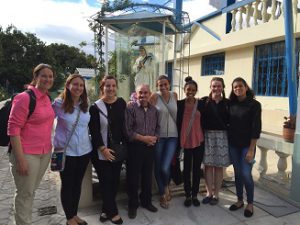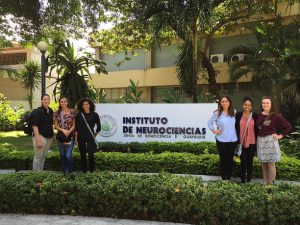 Students studying abnormal psychology got a rare glimpse into the clinical settings of Ecuador that most graduate students, let alone undergraduate students, never get in the United States. We had the opportunity to visit Ancianato Buena Esperanza, which was an all male elder care facility in Quito. This facility was run by nuns purely supported by donations. Many of the men were abandoned by their families and were living on the street before being rescued by this agency. We were able to interact with the men and help feed them dinner. They were so happy to see us. Of course, we were a group of eight young women! However, they are not accustomed to receiving visits very often and were happy to have people who cared visit with them. One of the younger more functional residents, pictured above with the group, was in charge of dispensing medications to the rest of the gentlemen at dinner. This is not a practice you would see in the United States!
Students studying abnormal psychology got a rare glimpse into the clinical settings of Ecuador that most graduate students, let alone undergraduate students, never get in the United States. We had the opportunity to visit Ancianato Buena Esperanza, which was an all male elder care facility in Quito. This facility was run by nuns purely supported by donations. Many of the men were abandoned by their families and were living on the street before being rescued by this agency. We were able to interact with the men and help feed them dinner. They were so happy to see us. Of course, we were a group of eight young women! However, they are not accustomed to receiving visits very often and were happy to have people who cared visit with them. One of the younger more functional residents, pictured above with the group, was in charge of dispensing medications to the rest of the gentlemen at dinner. This is not a practice you would see in the United States!
We also had the opportunity to visit the Instituto Psiquiatrico Sagrado Corazon, which is a privately owned and operated inpatient psychiatric facility in Quito. It is an extension of Hermanas Hospitalarias in Spain. We were presented with background information on the facility, the services and treatment programs available, as well as the various populations and disorders they work with. We were able to tour the facility and briefly interact with the patients. The motto and main focus of this organization is hospitality. This is a refreshing approach to mental health care as we look at the historical stigma throughout the world, not just in Ecuador or the United States.
 Later in our trip we visited the Instituto de Neurociencias, de la Junta de Beneficencia de Guayaquil. This is another privately owned and operated inpatient facility. This visit included a guided tour and a conversation with two of the psychologists on staff. Having the opportunity to visit two different facilities provided the opportunity to compare and contrast the practices at different institutions in Ecuador, but also with the practices and laws in the U.S. This facility was very focused on systemic therapy and psychoeducation. The administration requires patients to have one family member with them 24/7 at the facility. This allows the staff to work with those individuals who will play a vital role in their family member’s care, especially when they are discharged. Due to privacy laws in the United States, this not a practice that is offered; however, it could be very beneficial in the treatment of the patients as well as the family.
Later in our trip we visited the Instituto de Neurociencias, de la Junta de Beneficencia de Guayaquil. This is another privately owned and operated inpatient facility. This visit included a guided tour and a conversation with two of the psychologists on staff. Having the opportunity to visit two different facilities provided the opportunity to compare and contrast the practices at different institutions in Ecuador, but also with the practices and laws in the U.S. This facility was very focused on systemic therapy and psychoeducation. The administration requires patients to have one family member with them 24/7 at the facility. This allows the staff to work with those individuals who will play a vital role in their family member’s care, especially when they are discharged. Due to privacy laws in the United States, this not a practice that is offered; however, it could be very beneficial in the treatment of the patients as well as the family.
Also included in this program was a presentation by a private practice psychologist working in Quito, and a two day service learning project at a school in Ayampe, which you can read more about on this blog.
This was a wonderful opportunity to explore abnormal psychology outside of the classroom. Join us in the future to examine the cross cultural comparisons between the United States and Latin America in the assessment, diagnosis, prevention, and treatment of mental illness.
